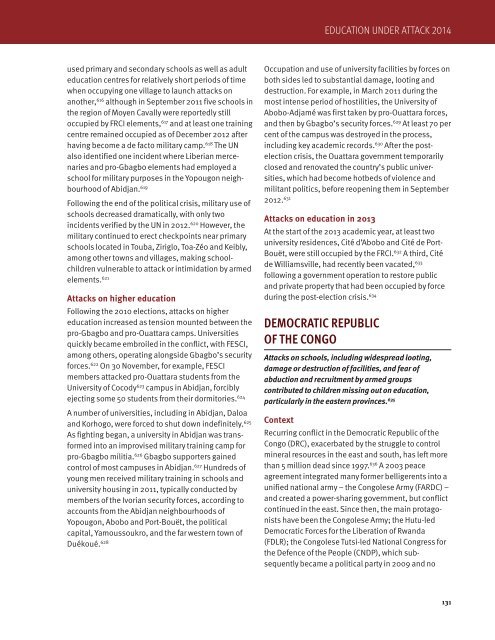You also want an ePaper? Increase the reach of your titles
YUMPU automatically turns print PDFs into web optimized ePapers that Google loves.
EDUCATION UNDER ATTACK 2014<br />
used primary and secondary schools as well as adult<br />
education centres for relatively short periods of time<br />
when occupying one village to launch attacks on<br />
another, 616 although in September 2011 five schools in<br />
the region of Moyen Cavally were reportedly still<br />
occupied by FRCI elements, 617 and at least one training<br />
centre remained occupied as of December 2012 after<br />
having become a de facto military camp. 618 The UN<br />
also identified one incident where Liberian mercenaries<br />
and pro-Gbagbo elements had employed a<br />
school for military purposes in the Yopougon neighbourhood<br />
of Abidjan. 619<br />
Following the end of the political crisis, military use of<br />
schools decreased dramatically, with only two<br />
incidents verified by the UN in 2012. 620 However, the<br />
military continued to erect checkpoints near primary<br />
schools located in Touba, Ziriglo, Toa-Zéo and Keibly,<br />
among other towns and villages, making schoolchildren<br />
vulnerable to attack or intimidation by armed<br />
elements. 621<br />
Attacks on higher education<br />
Following the 2010 elections, attacks on higher<br />
education increased as tension mounted between the<br />
pro-Gbagbo and pro-Ouattara camps. Universities<br />
quickly became embroiled in the conflict, with FESCI,<br />
among others, operating alongside Gbagbo’s security<br />
forces. 622 On 30 November, for example, FESCI<br />
members attacked pro-Ouattara students from the<br />
University of Cocody 623 campus in Abidjan, forcibly<br />
ejecting some 50 students from their dormitories. 624<br />
A number of universities, including in Abidjan, Daloa<br />
and Korhogo, were forced to shut down indefinitely. 625<br />
As fighting began, a university in Abidjan was transformed<br />
into an improvised military training camp for<br />
pro-Gbagbo militia. 626 Gbagbo supporters gained<br />
control of most campuses in Abidjan. 627 Hundreds of<br />
young men received military training in schools and<br />
university housing in 2011, typically conducted by<br />
members of the Ivorian security forces, according to<br />
accounts from the Abidjan neighbourhoods of<br />
Yopougon, Abobo and Port-Bouët, the political<br />
capital, Yamoussoukro, and the far western town of<br />
Duékoué. 628<br />
Occupation and use of university facilities by forces on<br />
both sides led to substantial damage, looting and<br />
destruction. For example, in March 2011 during the<br />
most intense period of hostilities, the University of<br />
Abobo-Adjamé was first taken by pro-Ouattara forces,<br />
and then by Gbagbo’s security forces. 629 At least 70 per<br />
cent of the campus was destroyed in the process,<br />
including key academic records. 630 After the postelection<br />
crisis, the Ouattara government temporarily<br />
closed and renovated the country’s public universities,<br />
which had become hotbeds of violence and<br />
militant politics, before reopening them in September<br />
2012. 631<br />
Attacks on education in 2013<br />
At the start of the 2013 academic year, at least two<br />
university residences, Cité d’Abobo and Cité de Port-<br />
Bouët, were still occupied by the FRCI. 632 A third, Cité<br />
de Williamsville, had recently been vacated, 633<br />
following a government operation to restore public<br />
and private property that had been occupied by force<br />
during the post-election crisis. 634<br />
DeMOCRATIC RePUBLIC<br />
OF THe CONGO<br />
Attacks on schools, including widespread looting,<br />
damage or destruction of facilities, and fear of<br />
abduction and recruitment by armed groups<br />
contributed to children missing out on education,<br />
particularly in the eastern provinces. 635<br />
Context<br />
Recurring conflict in the Democratic Republic of the<br />
Congo (DRC), exacerbated by the struggle to control<br />
mineral resources in the east and south, has left more<br />
than 5 million dead since 1997. 636 A 2003 peace<br />
agreement integrated many former belligerents into a<br />
unified national army – the Congolese Army (FARDC) –<br />
and created a power-sharing government, but conflict<br />
continued in the east. Since then, the main protagonists<br />
have been the Congolese Army; the Hutu-led<br />
Democratic Forces for the Liberation of Rwanda<br />
(FDLR); the Congolese Tutsi-led National Congress for<br />
the Defence of the People (CNDP), which sub -<br />
sequently became a political party in 2009 and no<br />
131


